China Arts & Entertainment
Top 10 Overview of China’s Most Popular TV Dramas May 2021
These are the best Chinese TV dramas of the moment.
Published
3 years agoon
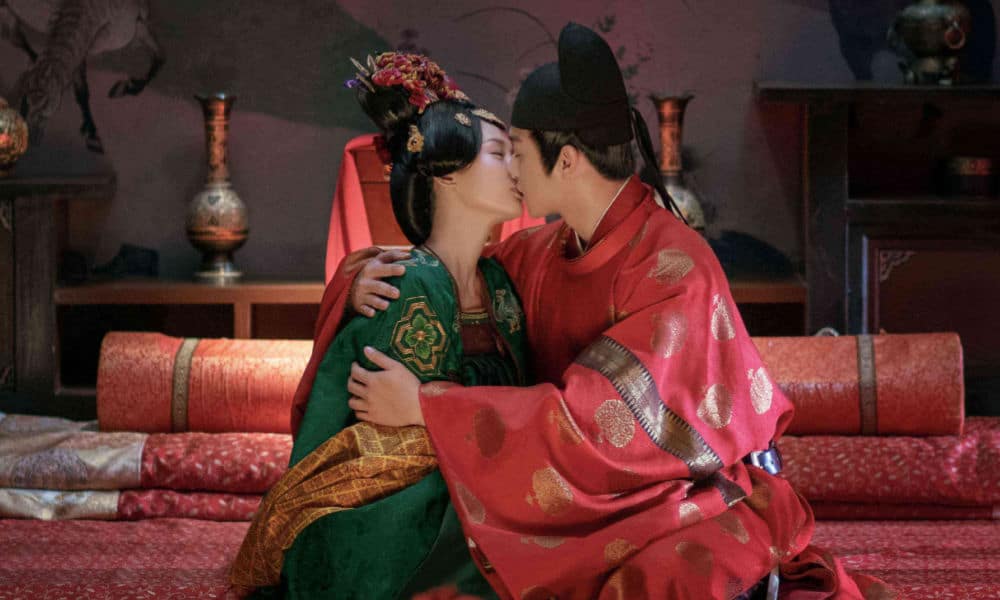
Time to binge-watch. These are some of the most popular TV dramas in China that are trending this 2021 season. An overview by What’s on Weibo.
It has been some time since we have made our last overview of popular Chinese TV dramas to watch this season. It’s high time to give an update on the latest popular TV dramas in China, especially because they recently often become trending topics on social media.
In a year in which China is focusing on its space program and is celebrating the 100th anniversary of the founding of the Communist Party, it is noteworthy that several TV dramas have come out themed around the military and historical topics that are being pushed in recent propaganda efforts.
We compiled a shortlist of China’s top TV dramas based on recent top lists of the leading search and online video platforms, from Baidu to iQiyi and 360kan. This is not an official list, since various platforms have their own hot lists that differ based on the site. We have compiled a top ten based on a combination of the current trending lists, with these ten shows popping up in the top ten lists across various top-ranking charts.
You can find most of the dramas with English subtitles available on YouTube or elsewhere – if so, we have included a link. These are the 10 shows that are trending around Chinese social media in May of 2021!
10. The Glory of Youth (号手就位 Hào shǒu jiù wèi)

- Date: Premiered in April of 2021 on Zhejiang Satellite TV
- Genre: Military Drama (49 episodes)
- Directed by: Li Lu (李路) and Zhang Hanbing (张寒冰)
- Screenplay by: Ying Liangpang (应良鹏), Feng Jie (丰杰), Zu Ruomeng (祖若蒙), Xue Tianzhe (薛天智). Adapted from the novel Getting Enlisted Upon Graduation (毕业了当兵去) by Feng Jie.
- Produced by: Propaganda Bureau of the Chinese People’s Liberation Army, Xi’an Qujiang Film and Television Company
- About: The Glory of Youth is also known under the English title of The Trumpeter in Position. This drama tells the story of four college students joining China’s PLA Rocket Force. It is the first Chinese drama to focus on the Rocket Force.
- Context: This TV series premiered in the same month when a key module of China’s new permanent space station was launched, with Chinese (popular) media increasingly focusing on China’s ambitious space programme.
- Trending: The drama’s premiere was held in Beijing on April 9, with nearly 200 officers and soldiers from the PLARF (People’s Liberation Army Rocket Force) attending the event.
- Link: TLYY (no English subtitles)
9. Word of Honor (山河令 Shānhélìng)
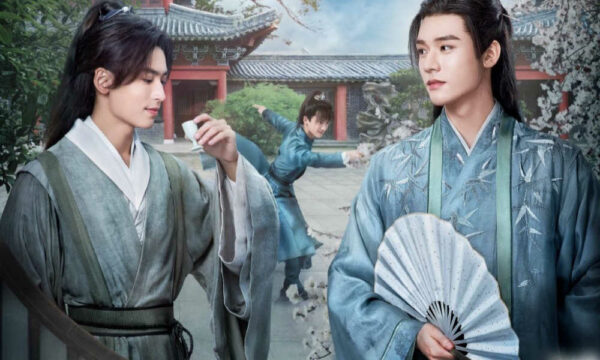
- Date: Premiered in February 22 of 2021
- Genre: Wuxia / Martial arts (36 episodes)
- Directed by: Cheng Zhichao (成志超), Ma Huagan (马华干), Li Hongyu (李宏宇)
- Screenplay by: Xiao Chu (小初), adapted from the danmei wuxia novel Tian Ya Ke (Faraway Wanderers) by Priest.
- Produced by: Ciwen Media, Youku
- About: Word of Honor tells the story of Zhou Zishu (played by Zhang Zhehan 张哲瀚), the leader of the emperor’s special “Window of Heaven” organization who leaves his post to pursue freedom. In doing so, he unwittingly gets involved with the martial world and the Ghost Valley master Wen Kexing (played by Gong Jun 龚俊), who wanders the world, always looking for a fight.
- Context:Word of Honor belongs to the danmei genre. Danmei (耽美) and ‘BL’ (for ‘Boys’ Love’) are umbrella terms for contents of ‘bromance’ or male-male homoerotic fiction (read more here). The Chinese web novel author ‘Priest,’ whose work this TV drama is based on, is among one of the most successful authors within the online BL fiction genre in China.
- Trending: Gong Jun and Zhang Zhehan are super popular as a ‘couple’ among fans of ‘CP’ in Chinese drama. The practice of imagining a relationship between two characters is known as ‘CP,’ an abbreviation for “coupling” or “character pairing.”
- Link: Viki (with English subtitles), also coming to Netflix!
8. Court Lady (骊歌行 Lígē xíng)
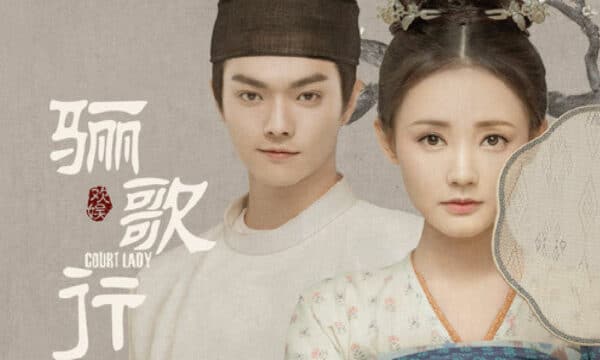
- Date: Premiered April 15 of 2021
- Genre: Costume, drama (55 episodes)
- Directed by: Wang Xiaoming (王晓明), Bai Yunmo (白云默), Shen Zhaoqing (申兆清)
- Screenplay by: Feng Nong (风弄)
- Produced by: Dongyang Huanyu Film Culture Co.
- About: Court Lady features actress Li Yitong (李一桐) and actor Xu Kai (许凯) as Fu Rou and Sheng Chumu. She is a merchant’s daughter, he is the son of the Duke of Lu. When Fu Rou becomes a court lady and Sheng joins the army, their love is put to the test. Their romantic story is set in the Tang Dynasty (618-907).
- Context: Over the past years, historical dramas in China faced difficulties due to tightening regulations on TV series distorting history and having a “bad influence on teens.” Dramas such as Court Lady but also The Long Ballad have been celebrated by state media for their “appealing storyline” and “positive messages” about China.
- Trending: The drama’s costume design is praised for its accuracy and beauty. Over 3000 costumes were designed for this production.
- Link: Viki (with English subtitles)
7. Octogenarian and The 90s (八零九零 Bā líng jiǔ líng)
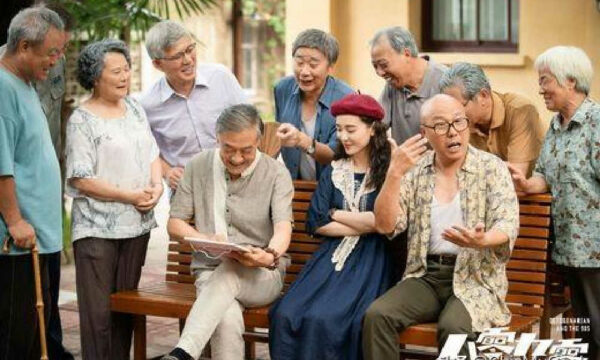
- Date: Premiered April 21 of 2021 on Hunan TV
- Genre: City, Family Drama (39 episodes)
- Directed by: Xu Jizhou (徐纪周) and Yi Jun (易军)
- Screenplay by: Long Zhenyu (龙振宇), Zhu Junyi (朱俊懿), Wu Yu’er (邬雩儿)
- Produced by: Zhejiang Huace Film & TV, Xiangxiang Shidai Entertainment, Beijing HualuBaina Film & TV Company, Haining Yueliang Kaihua, Beijing Leben
- About: “Sunshine Home” is the nursing home founded by Grandma Lin, the grandmother of the carefree millennial girl Ye Xiaomei (played by Wu Qian 吴倩). Carefree, until her grandmother becomes terminally ill and hands the nursing home over to Ye, who learns more from the elderly in the home than she could have ever imagined.
- Context: As China is dealing with a rapidly ageing population, there is an increased media focus on the lives and struggles of the elderly.
- Trending: Although this show is among the most popular TV dramas in China at the moment, it has also received criticism for being too superficial.
- Link: YouTube (with English subtitles)
6. Faith Makes Great (理想照耀中国 Lǐxiǎng Zhàoyào Zhōngguó)
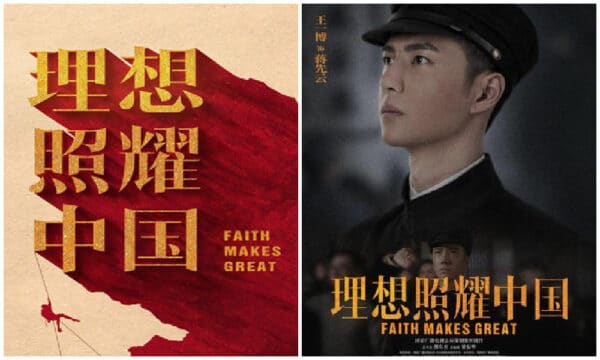
- Date: Premiered on May 5th of 2021
- Genre: Period drama (40 episodes)
- Directed by: Fu Dongyu (傅东育), who previously won an award for the drama Phurbu & Tenzin.
- Screenplay by: Liang Zhenhua (梁振华)
- Produced by: Hunan TV
- About: Faith Makes Great is a Chinese TV series based on true stories that happened throughout hundred years of communism in China. The drama is an initiative of China’s State Administration of Radio and Television to celebrate the 100th anniversary of the founding of the Chinese Communist Party.
- Context: 2021 is the year the Chinese Communist Party turns 100. This is one of the TV dramas commemorating the founding of the Party.
- Trending: One of the episodes of this series features the super popular Chinese celebrity Wang Yibo.
- Link: YouTube (with English subtitles)
5. Douluo Continent (斗罗大陆 Dòuluō Dàlù)
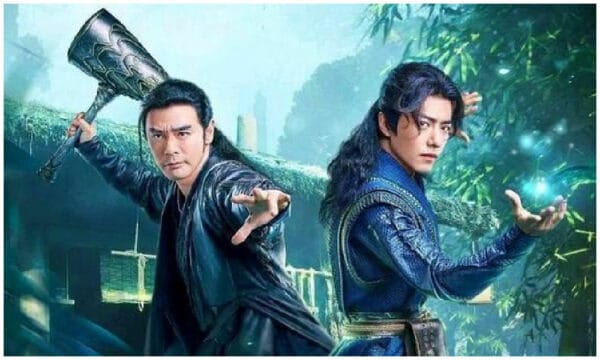
- Date: Premiered on February 5th of 2021
- Genre: Fantasy / Adventure (40 episodes)
- Directed by: Yang Zhenyu (杨振宇)
- Screenplay by: Wang Juan (王倦)
- Produced by: Tencent, New Classics Media, Xuanshi Tangmen, Dashenquan
- About: Douluo Continent was adapted from a fantasy novel by the same name written by Tang Jia San Shao (唐家三少). It tells the story of Tang San, played by the ever-popular Chinese celebrity Xiao Zhan. Tang San lost his mother as a child and becomes friends with another orphan named Xiao Wu (Betty Wu) while he is in training to be a Spirit Master. With his rare talents, Tang overcomes many difficulties while growing older and embarking on his journey.
- Trending: The producers of Douluo Continent issued an apology earlier this year for plagiarizing British TV series His Dark Materials and a role within the computer game League of Legends in the opening scene of the drama.
- Link: YouTube (with English subtitles)
4. My Treasure (生活家 Shēnghuó Jiā)

- Date: Premiered on May 13 of 2021
- Genre: City Drama (35 episodes)
- Directed by: Liu Haibo (刘海波), who also directed the 2019 show In the Name of the Law (and many others)
- Screenplay by: Teng Yang (滕洋)
- Produced by: iQiyi, Yuanshi Pictures, Tomorrow Film
- About: My Treasure follows the life of fresh graduate Qiu Dongna (Vicky Chen) and the struggles she faces while starting up her career and dealing with the people thwarting her plans.
- Context: Over recent years there has been a rise in Chinese TV dramas with a strong female leading role.
- Trending: The main role of this show, Qiu Dongna (邱冬娜), has won the hearts of many netizens on Chinese social media.
- Link: YouTube (with English subtitles)
3. Dancing in the Storm (风暴舞 Fēngbào Wǔ)

- Date: Premiered April 25th of 2021
- Genre: City, Spy drama (43 episodes)
- Directed by: Liu Xin (刘新), who also directed the 2020 hit show Hunting (猎狐)
- Screenplay by: An Zhiyong (安志勇) and Fu Li (傅莉)
- Produced by: Ciwen Media, iQiyi, Manmei Film
- About: Dancing in the Storm focuses on Clark Li Junjie (William Chan 陈伟霆) who works at an information security company where he accidentally discovers the company’s dangerous dealings with external parties. This discovery is the start of an investigation into a complicated web of intrigue.
- Context: This show should not be confused with another one with a similar title, namely Storm Eye (暴风眼), which is also a 2021 drama. That Chinese ‘national security’ drama came under fire for “overly dramatic plotlines.”
- Trending: The Weibo hashtag page of this drama (#风暴舞#) has by now received over 260 million views on Weibo.
- Link: YouTube (no English subtitles)
2. Awakening Age (觉醒年代 Juéxǐng Niándài)
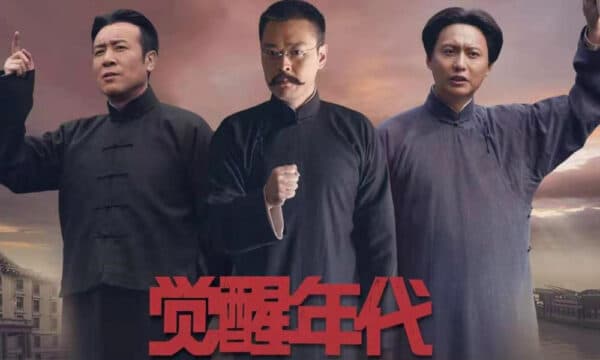
- Date: Premiered in February of 2021 on CCTV
- Genre: “Red drama”, Revolutionary historical drama (43 episodes)
- Directed by: Zhang Yongxin (张永新)
- Screenplay by: Long Pingping (龙平平)
- Produced by: CCTV
- About: Awakening Age tells the story of how the Party was founded, focusing on the events taking place in between 1916 and 1921.
- Context: 2021 is the year the Chinese Communist Party turns 100. This is one of the TV dramas commemorating the founding of the Party.
- Trending: Awakening Age has a hashtag page on Weibo (initiated by CCTV) that by now has received over 590 million views.
- Link: YouTube (no English subtitles)
1. A Love for Dilemma (小舍得 Xiǎo Shědé)

- Date: Produced in 2020 and premiered on iQiyi on April 11, 2021
- Genre: Family drama (42 episodes)
- Directed by: Zhang Xiaobo (张晓波), who also directed hit show Nothing But Thirty (三十而已, 2020)
- Screenplay by: Zhou Yifei (周艺飞)
- Produced by: iQiyi and Linmon Pictures
- About: This season’s super popular TV drama A Love for Dilemma is themed around family, parenting, and China’s competitive education system. In the series, two stepsisters compete against each other over the school results of their children. The family’s ‘grandpa’, played by famous actor Zhang Guoli (张国立), tries to create harmony around the dinner table between his daughter and stepdaughter, but the rivalry between the two and how they raise their children intensifies nevertheless. While stepsister Tian Yulan urges her little son to work hard in school and focus on his grades so that he can go to the best high school and university, sister Nan Li places more emphasis on the general development of her children and wants them to enjoy their childhood. Both mothers, however, question their own choices when facing challenges with how their children perform at school.
- Context: One of the reasons this drama is so popular in China right now is because of its depiction of the competitive education system and parent-child relationships of ordinary Chinese families.
- Trending: A Love for Dilemma ignited discussions on the term of ‘involution’ on Chinese social media (read more here), especially when discussing China’s education system, where competition starts as early as kindergarten and the pressure on children to succeed in the ‘gaokao’ college entrance exam starts many years before it takes place.
- Link: iQiyi (including subtitles)
Wanna read more on Chinese tv dramas? Check our other articles here.
By Manya Koetse
Follow @whatsonweibo
Spotted a mistake or want to add something? Please let us know in comments below or email us. First-time commenters, please be patient – we will have to manually approve your comment before it appears.
©2021 Whatsonweibo. All rights reserved. Do not reproduce our content without permission – you can contact us at info@whatsonweibo.com.
Manya Koetse is the founder and editor-in-chief of whatsonweibo.com. She is a writer, public speaker, and researcher (Sinologist, MPhil) on social trends, digital developments, and new media in an ever-changing China, with a focus on Chinese society, pop culture, and gender issues. She shares her love for hotpot on hotpotambassador.com. Contact at manya@whatsonweibo.com, or follow on Twitter.

China Arts & Entertainment
“Old Bull Eating Young Grass”: 86-Year-Old Chinese Painter Fan Zeng Marries 36-Year-Old Xu Meng
Online reactions to the news of Fan’s marriage to Xu Meng, his fourth wife, reveal that the renowned artist is not particularly well-liked among Chinese netizens.
Published
17 hours agoon
April 18, 2024
The recent marriage announcement of the renowned Chinese calligrapher/painter Fan Zeng and Xu Meng, a Beijing TV presenter 50 years his junior, has sparked online discussions about the life and work of the esteemed Chinese artist. Some netizens think Fan lacks the integrity expected of a Chinese scholar-artist.
Recently, the marriage of a 86-year-old Chinese painter to his bride, who is half a century younger, has stirred conversations on Chinese social media.
The story revolves around renowned Chinese artist, calligrapher, and scholar Fan Zeng (范曾, 1938) and his new spouse, Xu Meng (徐萌, 1988). On April 10, Fan announced their marriage through an online post accompanied by a picture.
In the picture, Fan is seen working on his announcement in calligraphic form.

Fan Zeng announces his marriage on Chinese social media.
In his writing, Zeng shares that the passing of his late wife, three years ago, left him heartbroken, and a minor stroke also hindered his work. He expresses gratitude for Xu Meng’s care, which he says led to his physical and mental recovery. Zeng concludes by expressing hope for “everlasting harmony” in their marriage.
Fan Zeng is a calligrapher and poet, but he is primarily recognized as a contemporary master of traditional Chinese painting. Growing up in a well-known literary family, his journey in art began at a young age. Fan studied under renowned mentors at the Academy of Fine Arts in Beijing, including Wu Zuoren, Li Keran, Jiang Zhaohe, and Li Kuchan.
Fan gained global acclaim for his simple yet vibrant painting style. He resided in France, showcased his work in numerous exhibitions worldwide, and his pieces were auctioned at Sotheby’s and Christie’s in the 1980s.[1] One of Fan’s works, depicting spirit guardian Zhong Kui (钟馗), was sold for over 6 million yuan (828,000 USD).

Zhong Kui in works by Fan Zeng.
In his later years, Fan Zeng transitioned to academia, serving as a lecturer at Nankai University in Tianjin. At the age of 63, he assumed the role of head of the Nankai University Museum of Antiquities, as well as holding various other positions from doctoral supervisor to honorary dean.
By now, Fan’s work has already become part of China’s twentieth-century art history. Renowned contemporary scholar Qian Zhongshu once remarked that Fan “excelled all in artistic quality, painting people beyond mere physicality.”
A questionable “role model”
Fan’s third wife passed away in 2021. Later, he got to know Xu Meng, a presenter at China Traffic Broadcasting. Allegedly, shortly after they met, he gifted her a Ferrari, sparking the beginning of their relationship.

A photo of Xu and her Hermes Birkin 25 bag has also been making the rounds on social media, fueling rumors that she is only in it for the money (the bag costs more than 180,000 yuan / nearly 25,000 USD).
On Weibo, reactions to the news of Fan’s marriage to Xu Meng, his fourth wife, reveal that the renowned artist is not particularly well-liked among netizens. Despite Fan’s reputation as a prominent philanthropist, many perceive his recent marriage as yet another instance of his lack of integrity and shamelessness.

Fan Zeng and Xu Meng. Image via Weibo.
One popular blogger (@好时代见证记录者) sarcastically wrote:
“Warm congratulations to the 86-year-old renowned contemporary erudite scholar and famous calligrapher Fan Zeng, born in 1938, on his marriage to Ms Xu Meng, a 50 years younger 175cm tall woman who is claimed to be China’s number one golden ratio beauty. Mr Fan Zeng really is a role model for us middle-aged greasy men, as it makes us feel much less uncomfortable when we’re pursuing post-90s youngsters as girlfriends and gives us an extra shield! Because if contemporary Confucian scholars [like yourself] are doing this, then we, as the inheritors of Confucian culture, can surely do the same!“
Various people criticize the fact that Xu Meng is essentially just an aide to Fan, as she can often be seen helping him during his work. One commenter wrote: “Couldn’t he have just hired an assistant? There’s no need to turn them into a bed partner.”
Others think it’s strange for a supposedly scholarly man to be so superficial: “He just wants her for her body. And she just wants him for his inheritance.”
“It’s so inappropriate,” others wrote, labeling Fan as “an old bull grazing on young grass” (lǎoniú chī nèncǎo 老牛吃嫩草).
Fan is not the only well-known Chinese scholar to ‘graze on young grass.’ The famous Chinese theoretical physicist Yang Zhenning (杨振宁, 1922), now 101 years old, also shares a 48-year age gap with his wife Weng Fen (翁帆). Fan, who is a friend of Yang’s, previously praised the love between Yang and Weng, suggesting that she kept him youthful.

Older photo posted on social media, showing Fan attending the wedding ceremony of Yang Zhenning and his 48-year-younger partner Weng Fen.
Some speculate that Fan took inspiration from Yang in marrying a significantly younger woman. Others view him as hypocritical, given his expressions of heartbreak over his previous wife’s passing, and how there’s only one true love in his lifetime, only to remarry a few years later.
Many commenters argue that Fan Zeng’s conduct doesn’t align with that of a “true Confucian scholar,” suggesting that he’s undeserving of the praise he receives.
“Mr. Wang from next door”
In online discussions surrounding Fan Zeng’s recent marriage, more reasons emerge as to why people dislike him.
Many netizens perceive him as more of a money-driven businessman rather than an idealistic artist. They label him as arrogant, critique his work, and question why his pieces sell for so much money. Some even allege that the only reason he created a calligraphy painting of his marriage announcement is to profit from it.
Others cast doubt on his status as a Chinese calligraphy ‘grandmaster,’ noting that his calligraphy style is not particularly impressive and may contain typos or errors. His wedding announcement calligraphy appears to blend traditional and simplified characters.

Netizens have pointed out what looks like errors or typos in Fan’s calligraphy.
Another source of dislike stems from his history of disloyalty and his feud with another prominent Chinese painter, Huang Yongyu (黄永玉). Huang, who passed away in 2023, targeted Fan Zeng in some of his satirical paintings, including one titled “When Others Curse Me, I Also Curse Others” (“人骂我,我亦骂人”). He also painted a parrot, meant to mock Fan Zeng’s unoriginality.

Huang Yongyu made various works targeting Fan Zeng.
In retaliation, Fan produced his own works mocking Huang, sparking an infamous rivalry in the Chinese art world. The two allegedly almost had a physical fight when they ran into each other at the Beijing Hotel.

Fan Zeng mocked Huang Yongyu in some of his works.
Fan and Huang were once on good terms though, with Fan studying under Huang at the Central Academy of Fine Arts in Beijing. Through Huang, Fan was introduced to the renowned Chinese novelist Shen Congwen (沈从文, 1902-1988), Huang’s first cousin and lifelong friend. As Shen guided Fan in his studies and connected him with influential figures in China’s cultural circles, their relationship flourished.
However, during the Cultural Revolution, when Shen was accused of being a ‘reactionary,’ Fan Zeng turned against him, even going as far as creating big-character posters to criticize his former mentor.[2] This betrayal not only severed the bond between Shen and Fan but also ended Fan’s friendship with Huang, and it is still remembered by people today.
Fan Zeng’s behavior towards another former mentor, the renowned painter Li Kuchan (李苦禪, 1899-1983), was also controversial. Once Fan gained fame, he made it clear that he no longer respected Li as his teacher. Li later referred to Fan as “a wolf in sheep’s clothes,” and apparently never forgave him. Although the exact details of their falling out remain unclear, some blame Fan for exploiting Li to further his own career.
There are also some online commenters who call Fan Zeng a “Mr Wang from next door” (隔壁老王), a term jokingly used to refer to the untrustworthy neighbor who sleeps with one’s wife. This is mostly because of the history of how Fan Zeng met his third wife.
Fan’s first wife was the Chinese female calligrapher Lin Xiu (林岫), who came from a wealthy family. During this marriage, Fan did not have to worry about money and focused on his artistic endeavours. The two had a son, but the marriage ended in divorce after a decade. Fan’s second wife was fellow painter Bian Biaohua (边宝华), with whom he had a daughter. It seems that Bian loved Fan much more than he loved her.
It is how he met his third wife that remains controversial to this day. Nan Li (楠莉), formerly named Zhang Guiyun (张桂云), was married to performer Xu Zunde (须遵德). Xu was a close friend of Fan, and helped him out when Fan was still poor and trying to get by while living in Beijing’s old city center.
Wanting to support Fan’s artistic talent, Xu let Fan Zeng stay over, supported him financially, and would invite him for meals. Little did he know that while Xu was away to work, Fan enjoyed much more than meals alone; Fan and Xu’s wife engaged in a secret decade-long affair.
When the affair was finally exposed, Xu Zunde divorced his wife. Still, they would use his house to meet and often locked him out. Three years later, Nan Li officially married Fan Zeng. Xu not only lost his wife and friend but also ended up finding his house emptied, his two sons now bearing Fan’s surname.
When Nan Li passed away in 2021, Fan Zeng published an obituary that garnered criticism. Some felt that the entire text was actually more about praising himself than focusing on the life and character of his late wife, with whom he had been married for forty years.

Fan Zeng and his four wives
An ‘old pervert’, a ‘traitor’, a ‘disgrace’—there are a lot of opinions circulating about Fan that have come up this week.
Despite the negativity, a handful of individuals maintain a positive outlook. A former colleague of Xu Meng writes: “If they genuinely like each other, age shouldn’t matter. Here’s to wishing them a joyful marriage.”
By Manya Koetse
[1]Song, Yuwu. 2014. Biographical Dictionary of the People’s Republic of China. United Kingdom: McFarland & Company, 76.
[2]Xu, Jilin. 2024. “Xu Jilin: Are Shen Congwen’s Tears Related to Fan Zeng?” 许纪霖:沈从文的泪与范曾有关系吗? The Paper, April 15. https://www.thepaper.cn/newsDetail_forward_27011031. Accessed April 17, 2024.
Independently reporting China trends for over a decade. Like what we do? Support us and get the story behind the hashtag by subscribing:
Spotted a mistake or want to add something? Please let us know in comments below or email us. First-time commenters, please be patient – we will have to manually approve your comment before it appears.
©2024 Whatsonweibo. All rights reserved. Do not reproduce our content without permission – you can contact us at info@whatsonweibo.com.
China Memes & Viral
Chengdu Disney: The Quirkiest Hotspot in China
How a senior activity park in Chengdu was ‘Disneyfied’ and became a viral hotspot.
Published
6 days agoon
April 12, 2024
How did a common park turn into a buzzing hotspot? By mixing online trends with real-life fun, blending foreign styles with local charm, and adding a dash of humor and absurdity, Chengdu now boasts its very own ‘Chengdu Disney’. We explain the trend.
– By Manya Koetse, co-authored by Ruixin Zhang
Have you heard about Chengdu Disney yet? If not, it’s probably unlike anything you’d imagine. It’s not actually a Disney theme park opening up in Chengdu, but it’s one of the city’s most viral hotspots these days.
What is now known as ‘Chengdu Disney’ all over the Chinese internet is actually a small outdoor park in a residential area in Chengdu’s Yulin area, which also serves as the local senior fitness activity center.
Crowds of young people are coming to this area to take photos and videos, hang out, sing songs, cosplay, and be part of China’s internet culture in an offline setting.
Once Upon a Rap Talent Show
The roots of ‘Chengdu Disney’ can be traced back to the Chinese hip-hop talent show The Rap of China (中国新说唱), where a performer named Nuomi (诺米), also known as Lodmemo, was eliminated by Chinese rapper Boss Shady (谢帝 Xièdì), one of the judges on the show.
Nuomi felt upset about the elimination and a comment made by his idol mentor, who mistakenly referred to a song Nuomi made for his ‘grandma’ instead of his grandfather. His frustration led to a viral livestream where he expressed his anger towards his participation in The Rap of China and Boss Shady.
However, it wasn’t only his anger that caught attention; it was his exaggerated way of speaking and mannerisms. Nuomi, with his Sichuan accent, repeatedly inserted English phrases like “y’know what I’m saying” and gestured as if throwing punches.
His oversized silver chain, sagging pants, and urban streetwear only reinforce the idea that Nuomi is trying a bit too hard to emulate the fashion style of American rappers from the early 2000s, complete with swagger and street credibility.

Lodmemo emulates the style of American rappers in the early 2000s, and he has made it his brand.
Although people mocked him for his wannabe ‘gangsta’ style, Nuomi embraced the teasing and turned it into an opportunity for fame.
He decided to create a diss track titled Xiè Tiān Xièdì 谢天谢帝, “Thank Heaven, Thank Emperor,” a word joke on Boss Shady’s name, which sounds like “Shady” but literally means ‘Thank the Emperor’ in Chinese. A diss track is a hip hop or rap song intended to mock someone else, usually a fellow musician.
In the song, when Nuomi disses Boss Shady (谢帝 Xièdì), he raps in Sichuan accent: “Xièdì Xièdì wǒ yào diss nǐ [谢帝谢帝我要diss你].” The last two words, namely “diss nǐ” actually means “to diss you” but sounds exactly like the Chinese word for ‘Disney’: Díshìní (迪士尼). This was soon picked up by netizens, who found humor in the similarity; it sounded as if the ‘tough’ rapper Nuomi was singing about wanting to go to Disney.

Nuomi and his diss track, from the music video.
Nuomi filmed the music video for this diss track at a senior activity park in Chengdu’s Yulin subdistrict. The music video went viral in late March, and led to the park being nicknamed the ‘Chengdu Disney.’
The particular exercise machine on which Nuomi performed his rap quickly became an iconic landmark on Douyin, as everyone eagerly sought to visit, sit on the same see-saw-style exercise machine, and repeat the phrase, mimicking the viral video.

What began as a homonym led to people ‘Disneyfying’ the park itself, with crowds of visitors flocking to the park, some dressed in Disney-related costumes.

This further developed the concept of a Chengdu ‘Disney’ destination, turning the park playground into the happiest place in Yulin.
Chengdu: China’s Most Relaxed Hip Hop Hotspot
Chengdu holds a special place in China’s underground hip-hop scene, thanks to its vibrant music culture and the presence of many renowned Chinese hip-hop artists who incorporate the Sichuan dialect into their songs and raps.
This is one reason why this ‘Disney’ meme happened in Chengdu and not in any other Chinese city. But beyond its musical significance, the playful spirit of the meme also aligns with Chengdu’s reputation for being an incredibly laid-back city.
In recent years, the pursuit of a certain “relaxed feeling” (sōngchígǎn 松弛感) has gained popularity across the Chinese internet. Sōngchígǎn is a combination of the word for “relaxed,” “loose” or “lax” (松弛) and the word for “feeling” (感). Initially used to describe a particular female aesthetic, the term evolved to represent a lifestyle where individuals strive to maintain a relaxed demeanor, especially in the face of stressful situations.
🌟 Attention!
For 11 years, What’s on Weibo has remained a 100% independent blog, fueled by my passion to write about China’s digital culture and online trends. Over a year ago, we introduced a soft paywall to ensure the sustainability of this platform. I’m grateful to all our loyal readers who’ve subscribed since 2022. Your support has been invaluable. But we need more subscribers to continue our work. If you appreciate our content and want to support independent China reporting, please consider becoming a subscriber. Your support keeps What’s on Weibo going strong!
The concept gained traction online in mid-2022 when a Weibo user shared a story of a family remaining composed when their travel plans were unexpectedly disrupted due to passport issues. Their calm and collected response inspired the adoption of the “relaxed feeling” term (also read here).
Central to embodying this sense of relaxation is being unfazed by others’ opinions and avoiding unnecessary stress or haste out of fear of judgment.
Nowadays, Chinese cities aim to foster this sense of sōngchígǎn. Not too long ago, there were many hot topics suggesting that Chengdu is the most sōngchí 松弛, the most relaxed city in China.
This sentiment is reflected in the ‘Chengdu Disney’ trend, which both pokes fun at a certain hip-hop aesthetic deemed overly relaxed—like the guys who showed up with sagging pants—and embraces a carefree, childlike silliness that resonates with the city’s character and its people.

Mocking sagging pants at ‘Chengdu Disney.’
Despite the influx of visitors to the Chengdu Disney area, authorities have not yet significantly intervened. Community notices urging respect for nearby residents and the presence of police officers to maintain order indicate a relatively hands-off approach. For now, it seems most people are simply enjoying the relaxed atmosphere.
Being Part of the Meme
An important aspect that contributes to the appeal of Chengdu Disney is its nature as an online meme, allowing people to actively participate in it.

Scenes from Chengdu Disney, images via Weibo.
China has a very strong meme culture. Although there are all kinds of memes, from visual to verbal, many Chinese memes incorporate wordplay. In part, this has to do with the nature of Chinese language, as it offers various opportunities for puns, homophones, and linguistic creativity thanks to its tones and characters.
The use of homophones on Chinese social media is as old as Chinese social media itself. One of the most famous examples is the phrase ‘cǎo ní mǎ’ (草泥马), which literally means ‘grass mud horse’, but is pronounced in the same way as the vulgar “f*ck your mother” (which is written with three different characters).
In the case of the Chengdu Disney trend, it combines a verbal meme—stemming from the ‘diss nǐ’ / Díshìní homophone—and a visual meme, where people gather to pose for videos/photos in the same location, repeating the same phrase.
Moreover, the trend bridges the gap between the online and offline worlds, as people come together at the Chengdu playground, forming a tangible community through digital culture.
The fact that this is happening at a residential exercise park for the elderly adds to the humor: it’s a Chengdu take on what “urban” truly means. These colorful exercise machines are a common sight in Chinese parks nationwide and are actually very mundane. Transforming something so normal into something extraordinary is part of the meme.

A 3D-printed model version of the exercise equipment featured in Nuomi’s music video.
Lastly, the incorporation of the Disney element adds a touch of whimsy to the trend. By introducing characters like Snow White and Mickey Mouse, the trend blends American influences (hip-hop, Disney) with local Chengdu culture, creating a captivating and absurd backdrop for a viral phenomenon.
For some people, the pace in which these trends develop is just too quick. On Weibo, one popular tourism blogger (@吴必虎) wrote: “The viral hotspots are truly unpredictable these days. We’re still seeing buzz around the spicy hot pot in Gansu’s Tianshui, meanwhile, a small seesaw originally meant for the elderly in a residential community suddenly turns into “Chengdu Disneyland,” catching the cultural and tourism authorities of Sichuan and even Shanghai Disneyland off guard. Netizens are truly powerful, even making it difficult for me, as a professional cultural tourism researcher, to keep up with them.”
By Manya Koetse, co-authored by Ruixin Zhang
Independently reporting China trends for over a decade. Like what we do? Support us and get the story behind the hashtag by subscribing:
Spotted a mistake or want to add something? Please let us know in comments below or email us. First-time commenters, please be patient – we will have to manually approve your comment before it appears.
©2024 Whatsonweibo. All rights reserved. Do not reproduce our content without permission – you can contact us at info@whatsonweibo.com.
Subscribe

“Old Bull Eating Young Grass”: 86-Year-Old Chinese Painter Fan Zeng Marries 36-Year-Old Xu Meng

Chengdu Disney: The Quirkiest Hotspot in China

Where to Eat and Drink in Beijing: Yellen’s Picks

Weibo Watch: Burning BMWs

More than Malatang: Tianshui’s Recipe for Success

The ‘Two Sessions’ Suggestions: Six Proposals Raising Online Discussions

A Snowball Effect: How Cold Harbin Became the Hottest Place in China

Jia Ling Returns to the Limelight with New “YOLO” Movie and 110-Pound Weight Loss Announcement

Top 9 Chinese Movies to Watch This Spring Festival Holiday

Party Slogan, Weibo Hashtag: “The Next China Will Still Be China”

From Pitch to Politics: About the Messy Messi Affair in Hong Kong (Updated)

Weibo Watch: Frogs in Wells

Looking Back on the 2024 CMG Spring Festival Gala: Highs, Lows, and Noteworthy Moments

Two Years After MU5735 Crash: New Report Finds “Nothing Abnormal” Surrounding Deadly Nose Dive

More than Malatang: Tianshui’s Recipe for Success
Get in touch
Would you like to become a contributor, or do you have any tips or suggestions? Get in touch here!
Popular Reads
-

 China Insight1 month ago
China Insight1 month agoThe ‘Two Sessions’ Suggestions: Six Proposals Raising Online Discussions
-

 China Insight3 months ago
China Insight3 months agoA Snowball Effect: How Cold Harbin Became the Hottest Place in China
-

 China Arts & Entertainment3 months ago
China Arts & Entertainment3 months agoJia Ling Returns to the Limelight with New “YOLO” Movie and 110-Pound Weight Loss Announcement
-

 China Arts & Entertainment2 months ago
China Arts & Entertainment2 months agoTop 9 Chinese Movies to Watch This Spring Festival Holiday







LIHAN
May 23, 2021 at 3:17 pm
确实很专业的网站,加油!
Thiughts and Writings
July 23, 2021 at 3:49 am
I love The Long Ballad more than any of these drama listed here. And Ashile Sun is an iconic character justified by Leo Wu’s awesome portrayal.
Raine
September 15, 2021 at 11:03 am
Word of Honour is hands down my favourite drama this year.
Douluo Continent I was enjoying till I realised there were not enough episodes left to finish the story so I didn’t bother finishing it.
Will keep an eye out for Court Lady on my apps … love Xu Kai.